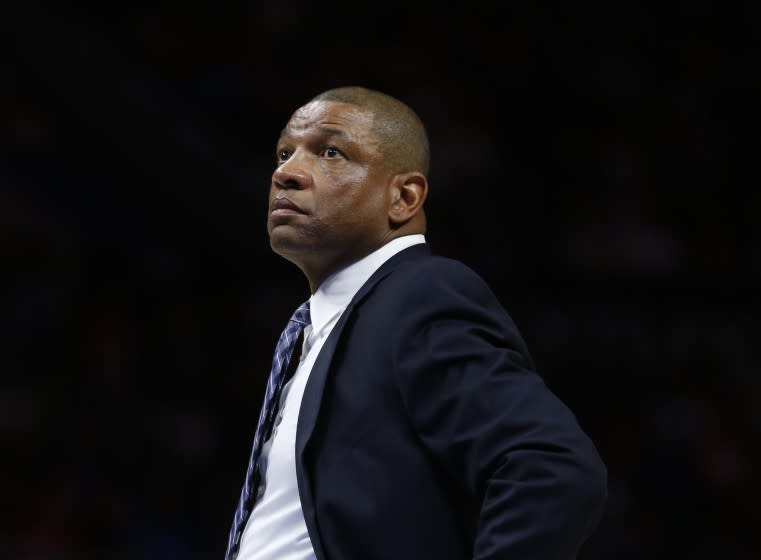Elliott: Doc Rivers should be remembered for what he accomplished, and what he didn't do

Clippers players didn’t want to hear anything Doc Rivers intended to say after TMZ released tapes of racist remarks by then-owner Donald Sterling. Players were mutinous, furious. They pushed aside concerns about Game 4 of their 2014 first-round playoff series against Golden State while they burned over Sterling’s heinous comments and discussed what to do next.
Summoned to an emergency team meeting, Rivers noticed several players had folded their arms across their chest, a classic defensive posture. He had to let them know he shared their outrage. He also had to tell them not to let Sterling’s hatred taint their season and tarnish their dreams.
“I remember stopping and saying, ‘Guys, I want to remind you of something. My name is Glenn Rivers. I’m from Chicago and I’m Black and I’m pissed. And our owner’s a racist and I don’t want to do anything for that man,’” he said in an interview aired on TNT this year. As a kid, when he imagined playing for a championship, racism wasn’t part of his story, Rivers said. He refused to allow Sterling’s odious attitude to infect his narrative. They shouldn’t, either.
Rivers became his players’ voice, calming them as they went on to beat the Warriors in seven games. It was a role he played well. He reprised it this summer, harmonizing with them as players awoke to the power they had to advance social justice causes from the cocoon of the NBA’s pandemic-imposed bubble.
His crumbling composure and faltering voice as he spoke last month about Jacob Blake being shot by a police officer in Kenosha, Wis., humanized the anguish so many Black people were feeling. “It’s amazing why we keep loving this country and this country does not love us back,” he said haltingly, just a few minutes after the Clippers had routed Dallas in Game 5 of the first round.
Rivers embodied the Clippers’ collective conscience, and his unifying eloquence should never be forgotten. But his seven seasons as their coach will be remembered more for what he couldn’t do — for blowing a 3-1 series lead over Houston in the second round of the 2015 playoffs with the Lob City crew and, more egregiously, for taking a team that had been rebuilt around game-changers Kawhi Leonard and Paul George and failing to change a history of playoff futility by squandering a 3-1 series lead over Denver two weeks ago.
In a news release issued Monday, the Clippers framed Rivers’ departure as coach as a “mutual decision” reached by Rivers and owner Steve Ballmer. Maybe it was.
And maybe both sides realized that the way the Clippers had lost, an exit greased by questionable coaching decisions and too-frequent mentions of their lack of familiarity and chemistry, meant Rivers had lost credibility among players and couldn’t be effective if he returned. Looking back to their finale, it’s easy to see the first indication that he had lost his hold on the team when several players asked to be taken out of Game 7 before the final buzzer. That’s almost incomprehensible. But so was their loss in a series they could have won.
“Doc has been a terrific coach for the Clippers, an incredible ambassador, and a pillar of strength during tumultuous times,” Ballmer said in the statement. “He won a heck of a lot of games and laid a foundation for this franchise.”
Rivers leaves a team whose future might not be so rosy considering George and Leonard both have a player option in 2021 and can be gone after next season. Don’t forget, the Clippers gave up five first-round draft picks to acquire George from Oklahoma City, so the next rebuild will be long and tedious and will start around the time Ballmer will be trying to sell suites and season tickets at his new palace in Inglewood. Good luck with that.
Players’ comments after Game 7 against Denver cited their lack of conditioning, which conceivably can be blamed on the coaches, at least in part. Players also pointed to a lack of poise. No coach can teach that.
“Just us being smarter, us being able to know what to do in situations when guys are playing certain ways,” Leonard said when asked what the Clippers must add next season. They lacked what he called championship chemistry, the knowledge of “exactly what to do when a team is throwing different scenarios at you.” He added, “We were right there. There’s no excuses. We should have finished it off.”
George said they didn’t need any roster changes to lift them to the forbidden world of the conference finals for the first time in franchise history. What they need, he said, is simple.
“Just chemistry, being together. The more we can be together, the better we will be,” he said. But he threw in a surprise when he said, “Internally, we’ve always felt this is not a championship-or-bust year for us.”
Why wasn’t it championship or bust? Next season holds no promises, especially since it’s unclear when next season will start and what form it will take.
The Clippers had an opportunity to achieve something extraordinary but settled for being the same, old confounding Clippers. After they were eliminated, Rivers didn’t point fingers when asked by reporters where things had gone wrong.
“I’ll let you do all the blaming. I don’t play that game. You can figure that one out on your own,” he said.
The reckoning cost him his coaching job. As principled and eloquent as he was throughout his tenure, the NBA is a make or miss league and he missed once too often and too badly.


